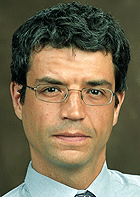José Luis Bermúdez, Ph.D., professor of philosophy in Arts & Sciences, has been named director of the University’s Center for Programs effective July 1, announced Edward S. Macias, Ph.D., executive vice chancellor, dean of Arts & Sciences and the Barbara and David Thomas Distinguished Professor in Arts & Sciences.

“I am pleased that José is assuming leadership of the Center for Programs,” Macias said. “His creativity, ability to work with many different groups and desire to advance Arts & Sciences have combined to advance the Philosophy-Neuroscience-Psychology program in exciting new directions, and I am confident that the same enthusiasm will mean great things for the Center for Programs. We couldn’t have a better spokesperson for interdisciplinary teaching and scholarship than José Bermúdez.”
Established in 2005, the Center for Programs is designed to promote interdisciplinary teaching and research in Arts & Sciences. For the past two years, Center programs have been shaped by founding director Gerald Early, Ph.D., the Merle Kling Professor of Modern Letters and professor of English, African & African American studies and American culture studies. Early will continue as director of The Center for the Humanities in Arts & Sciences.
Bermúdez, who studies non-linguistic thought in children and animals, as well as the nature of self-consciousness, joined the University in 2003 as professor of philosophy and director of the University’s Philosophy-Neuroscience-Psychology Program, both in Arts & Sciences. He has more than 100 publications, including three single-authored books and four edited volumes.
A member of the McDonnell Project on Philosophy and Neuroscience, Bermúdez earned a doctorate from Cambridge University in 1992 and served previously as the chair of philosophy at University of Stirling, Scotland.
Bermúdez will work with Macias and the Academic Planning Committee to review interdisciplinary programs in Arts & Sciences. He’s looking forward to expanding the center’s interdisciplinary mission.
“Excellence in interdisciplinary teaching and research is one of Washington University’s greatest strengths, and the Center for Programs is almost unique among American universities in its mission of promoting scholarship and student learning across the traditional boundaries of academic disciplines,” Bermúdez said.
“It is an honor to continue Gerald Early’s achievements as founding director of the Center for Programs. I’m greatly looking forward to working with members of the executive board to support and strengthen interdisciplinary collaborations within Arts & Sciences — and between Arts & Sciences and the other schools.”
Bermúdez already has been active in organizing a National Science Foundation-funded collaborative workshop with the Center for Research in Psychology and Cognitive Science at Tsinghua University in Beijing.
Held at Tsinghua from July 16-21, the “U.S.-China Joint Workshop on Memory and Language: Interdisciplinary Perspectives” involved Bermúdez and seven other faculty from the departments of psychology, philosophy and education in Arts & Sciences, in addition to participants from Duke and Tufts universities, and the University of North Carolina, together with graduate students from Washington University.
Since its founding, the Center has awarded five “seed” grants for interdisciplinary joint faculty projects and two grants for student interdisciplinary projects. In April, the Center hosted a faculty workshop exploring the who, how and why of collaborative interdisciplinary research. A follow-up workshop on funding interdisciplinary research will take place in September 2007. The center also publishes a newsletter, Cross Currents.
The Center for Programs executive board is composed of the directors of the following Arts & Sciences programs and centers: African & African American Studies, American Culture Studies, The Center for the Humanities, Center for the New Institutional Social Sciences, Center for the Study of Ethics & Human Values, Environmental Studies, Film and Media Studies, Interdisciplinary Program in Archaeology, Interdisciplinary Project in the Humanities, International and Area Studies, Jewish, Islamic and Near Eastern Studies, Legal Studies, Philosophy-Neuroscience-Psychology, Religious Studies and Women and Gender Studies.